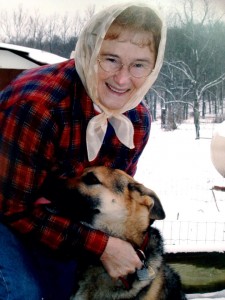 My mother, age 85, had experienced some weight loss over the summer. Because her doctor had changed roles, she no longer had a primary care physician. By early fall, I knew I’d have to help her get started with someone else, so I made a few calls and hooked her up with a doc who was well-known for a great bedside manner with the elderly. I went along with her to the first appointment and, right away, he suspected her gall bladder. A few weeks later, tests had confirmed it was malfunctioning and we gathered in the outpatient surgery center at her award-winning regional hospital. When the surgeon came in after an all-too-brief procedure, we were taken back to learn that cancer, now at stage IV, had completely infected virtually every type of organ and tissue in her abdomen. According to the surgeon, Mom would be lucky to see Christmas. Looking back, the surgeon was spot-on. We buried her in the Lucas Cemetery a week ago Saturday, exactly 30 days after first learning of her condition.
My mother, age 85, had experienced some weight loss over the summer. Because her doctor had changed roles, she no longer had a primary care physician. By early fall, I knew I’d have to help her get started with someone else, so I made a few calls and hooked her up with a doc who was well-known for a great bedside manner with the elderly. I went along with her to the first appointment and, right away, he suspected her gall bladder. A few weeks later, tests had confirmed it was malfunctioning and we gathered in the outpatient surgery center at her award-winning regional hospital. When the surgeon came in after an all-too-brief procedure, we were taken back to learn that cancer, now at stage IV, had completely infected virtually every type of organ and tissue in her abdomen. According to the surgeon, Mom would be lucky to see Christmas. Looking back, the surgeon was spot-on. We buried her in the Lucas Cemetery a week ago Saturday, exactly 30 days after first learning of her condition.
I reflected with visitors at her funeral visitation that it would appear that, with Stage IV cancer at age 86, there are really only 3 options.
First, one could get hit by a concrete truck coming out of the hospital. At first, this solution appears to be the best. After all, no matter how you slice it, cancer is an evil monster that consumes you from the inside-out. But the downside of this solution is, you have little opportunity to say goodbye to friends and family members. What’s more, if you haven’t prepared for the worst, you have zero time to do so in this approach.
At the other end of the spectrum is the one-year version. In this particular solution, one spends an inordinate amount of money for outlandish treatments, eventually landing in professional care institutions that might sap all your dignity, your savings, and your family time. Sure — due to all the fancy treatments, one might gain 60 days or so. But, according to some, the quality of the time drops exponentially.
My mother chose the 30-day option. No treatment whatsoever. She opted for a great hospice organization (Premier Hospice in Seymour, Indiana — we hope you’re lucky enough to live in southern Indiana so you can use them?) and spent her final month relaxing in her own home. I overheard her once, while I was doing dishes in the next room, telling a friend on the phone, “There’s no doubt cancer is a terrible outcome, but I have to say — it’s great having my sons living here again.” We took turns serving her, each of us grateful for some saved-up vacation and/or “family leave” time (and for understanding organizations, along with teammates who covered for us). Although Mom didn’t like the downside of cancer, she loved having her 3 sons in the house again. We laughed, reminisced, reflected, and, thank God, prepared one another for what might have been a terrible road ahead.
So… all of that to say, what lessons have we learned from losing my mother? Here are a few, in no particular order:
a) Get checked-out regularly, regardless of your age — One would think that by now we’d all know this. But I’m kind of surprised that there are still many people who don’t take advantage of annual check-ups. To me, it’s a bit like driving 70 mile per hour into the fog. Sure you can do it. But why would you WANT to? Most insurance companies cover the cost of check-ups. And even if they don’t, what’s that old adage about “an ounce of prevention is better than a pound of cure?” At age 86, sure my mother opted not to get treated. But at least she was empowered with all the information so she could make an informed decision. This is a bit like backing up your computer. We just have to be vigilant and do it, whether missionaries, ministers, or — regardless.
b) Get the right people in the room to advise you — My two brothers and I were taking turns caring for our 86-year-old mother. (She had always told us – if we “were tempted to take her to a nursing home, please take her over on the hill and put a bullet in her head.” Frankly, she would have rather died than entered one. Somehow, by God’s grace, she avoided it.) My wife and I happened to be the ones on duty as her body wound down. Things began to get a bit dicey. If I may speak forthrightly, she was entering a phase in which she was vomiting and her body was being tested in every way. Right away (hats off to her), the marketing director of the hospice company spotted the situation and brought in an incredibly-experienced and well-trained professional. She knew end-of-life signs AND treatment. In 20 minutes, they trained my wife and me to walk my mom through what might have been the most difficult hours of her entire 86 years. Thanks to their insights, those last 9 hours were as painless and peaceful as one could ever imagine. My mother was lucid yet pain-free. She talked openly about the situation and my wife and I knew exactly what to do. At the end of the day, I’m now convinced — nothing trumps training and experience. Death is not the time to experiment with interns. Thanks to the marketing director and the hospice company — and to the professional they brought to our living room.
c) Hope for miracles, but also prepare for a more sobering reality — So many believers were stopping my mother, sometimes in the aisles at Walmart, with well-intended admonitions like, “Sally, just believe!” They’d tell her, “Jesus can heal you of this if you have faith!” Please hear me well: My mom had a great attitude. But this whole scenario was confusing. I finally put together an article to try to help her sort it all out — and she indicated that it did. (Read the story at the bottom of the page here…
We won’t repeat everything here… so please read the article to see our suggestions about how to pray for the seriously ill.)
d) Prepare and talk openly and often about worst-case scenarios — When and why did conversations about death become so taboo? (Why would mother wait until just days before her death to tell me where I would find the key to her lock box? Come to find out, she had appointed me as executor and her personal representative. She did that all the way back in the year 2000, bless her heart. If she had passed away during those 13 years, I would have been clueless. (She had stored it in a VERY obscure location, by the way.) If we’ve prepared for it, what is death — other than transitioning to life eternal? My thoughts are — few things are more important. Let’s sort this stuff out today so we’re ready.
Do you have additional thoughts about preparing for the ultimate transition? Just click in the comment box following the web version of this item… and thanks for taking time to share your testimony.


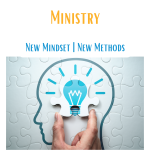
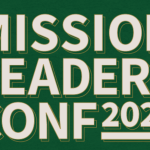
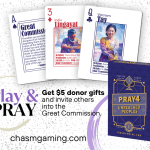


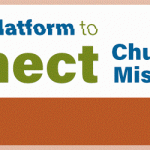




Thanks, Doug!
Hi, Doug;
I have been a long-time subscriber to Brigada Today. I am an 86-year-old retired missionary. I found your writings upon the death of your mom most helpful and encouraging. Nine months ago I was diagnosed, following episodes of shortness of breath followed by lung biopsy surgery, with stage !V adeno-carcinoma of the right lung pleura.
I was told up front that my condition at my age was “untreatable and incurable.” I was in the hospital for 11 days recovering from what should have been a 2-day stay following the biopsy. The next days and weeks brought us (my wife, my family and me) many questions. Advanced testing of the biopsy revealed that the cell mutation that allowed the cancer development was of a type for which a newly developed “pill” (so-called “directed therapy” as apposed to chemo) was available. We were told that it typically had very few side effects. But we were to learned that it is exorbitantly expensive–way beyond my means. But God arranged for me to be able to receive full financial assistance in receiving the medication without any cost to me through a special grant by the manufacturer.
I have now been on the treatment for 7 months and God has intervened by using this treatment to retard the cancer growth and so far prevent its spread to any other organs. I want to share that God has given complete peace in this process and I realize that apart from our Lord’s return, death is ultimately inevitable. He is enabling me to be up and around, able to drive and absolutely pain-free. The cancer at this point has not been cured, but I am ready, with His strength and by His grace, for whatever lies ahead Energy level is very low but that is really a minor factor in the overall picture. I praise God for His peace and for His miraculous care for me thus far in this never-before-traveled path. Thanks for your encouraging article.
Dale, four years ago I was diagnosed with Stage 4A non-Hodgkins lymphoma plus an aggressive B-cell lymphoma that responded to immunotherapy with Rituxan. Prayers and six courses of chemotherapy cured the rest, and my risk of recurrence is now “that of the general population” — essentially cured.
Now you and I face the issues of serving God well in these added years. God has a purpose for each of us, even though we can’t discern why. In faith, we must focus on Him and avoid making mistakes like Hezekiah’s. These next years could be our best!
My deepest sympathy to you and your family at the loss of your Mother. May the Lord comfort you. And thank you for a moving and helpful article. You shared your personal journey to aid others.
Thank you so much for sharing about such a personal time. Your article is full of great advice and answers some questions I’ve had. God bless y’all as you’re dealing with the loss of your precious mother.
Bro. Doug,
Thanks for sharing so much from your heart! May God see you & yours through with His loving comfort during this time of great loss – on earth – and great gain – in heaven. My wife & I have accompanied parents & grandparents during their final days on this earth, including being with them as they breathed their last. Nothing ever fully prepares us for this. Thank our Lord for the eternity we’ll be sharing together in Heaven!
Take care,
Howard & Blythe
What an inspiring and helpful article, Doug! Thank you very, very much!
Consider the last two verses of “Praise the Savior”:
“Keep us, Lord; O keep us cleaving
To Thyself, and still believing
‘Til the hour of our receiving
Promised joys with Thee.
“Then we shall be what we should be;
Then we will be where we would be;
Things that are not now, nor could be,
Then shall be our own.”
That last verse is for your mother: she’s cured indeed! Pain, cares, and suffering are all ‘ancient history’.
And that fourth verse is for those who remain: let the Lord “keep” — as in guard, watch over, protect, care for, and sustain — Doug and other believers who must bear being left behind. Sally’s enjoying “pleasures forevermore”, but we’re stuck “down here” — yet God is still down here for each of us. Let Him sustain and comfort you now, Doug.
Doug:
Having gone through cancer with my Dad in 2008, I second the recommendation for good hospice care! When Don’s Dad passed in 2004, we had no clue until rather late in the process. With my Dad, the hospice caretakers were so helpful. They were happy to take over in those situations where we felt uncomfortable (not something a daughter wants to do for her Dad), and sat down with Mom and us girls (my brother was working and couldn’t get time off) to explain everything that was happening and his medications very clearly. (I turned to Don one day and said: “We really messed up not contacting hospice care when the doctor said with your Dad!”)
Also, I second the recommendation for being prepared. I went up to visit my Mom for a week in October 2009 (she passed in March, 2010). She turned to me one day and said, “Karen, would you help write down things for my funeral? I know what I want but everyone else is putting me off when I ask for help.” I know it was because they didn’t want to think about her death, but it was something that gave her such peace! She sat there and dictated what songs, who was to speak (all 4 of us!), etc. Okay, she did say “no pictures” – which we ignored. (Can I say that? We decided that the service for those still living to celebrate her life and that called for pictures. She was gone and what could she do about it! :) )
She also turned to me one afternoon and said: “Karen, when I look up and Jesus is at the door calling me, I’m going. I’m ready to go.” I said: “Mom, I’m not sure we’re ready to let you go.” She replied: “I know. That’s why I’m telling you to get ready.” Listen and release them to go when they are ready, even if you’re not!
When she died in March, we were able to print up that document and everything was outlined for us. It gave us something to focus on. Loosing someone is hard, and these preparations help guide you when you’re not thinking clearly.
The only negative was that when I arrived just 3 days after she died, everything had been cleaned out of her apartment and given away. There was no place to go, remember and grieve. I know not everyone needs that, but I’m the kind of person where the “being” is part of the grieving and not being able to do that left something “undone”. Check with your siblings. Even if it doesn’t matter to you, it may be a part of their grieving and healing. (Take heed, you Unsentimental Ones!)
Thanks for sharing this personal journey with us, Doug. Appreciated the balance in your article. May God give strength to all three of you sons. He is obviously already giving the comfort of wonderful memories in the face of this loss. You
had a wonderful Mom!
Thanks for the article Doug and my condolences for you and your family on your mother’s “Graduation”. You write so well about everything from your kid’s soccer games/matches, to a bit more serious things such as this. Keep on keeping on.
I’m very sorry for your loss, but grateful for your openness and advice. It’s very difficult to say goodbye (for now) to your mom! May the Lord’s peace and comfort surround and sustain you and fill the hole in your heart.
I’m very interested in equipping people to support those who are grieving a deep loss. I have found that generally, the younger someone is, the less equipped they are and the more often they let unhelpful things slip out of their mouths.
Perhaps next time you could ask for feedback on what is helpful and what is not helpful for others to do who want to support one who grieves. I am especially interested in equipping churches and supporters to walk alongside missionaries who lose someone back home but then must return to the field and continue serving.